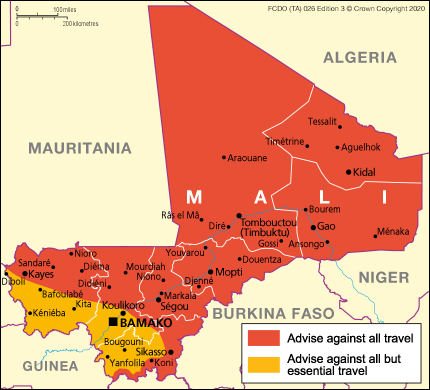Mali
Summary

The FCDO advises against all travel to:
- The regions of Tombouctou, Kidal, Gao, Mopti and Segou.
- All areas situated to the north of the line running from Kayes, north of Koulikoro, to Sikasso and Koni, including the towns of Kayes, Segou, Sikasso and Koni.
- Areas west of the border between Mali and Burkina Faso, as far as, and including the towns of Sikasso and Koni.
- Within 20km of the border with Côte d’Ivoire from Koni westwards.
The FCDO advises against all but essential travel to the rest of Mali, including Bamako.
COVID-19 entry restrictions for Mali
Before you travel, check the ‘Entry requirements’ section for Mali’s current entry restrictions and requirements. These may change with little warning. Monitor this advice for the latest updates and stay in contact with your travel provider.
IfTravelling youfrom planand returning to passthe throughUK
Check anotherwhat countryyou tomust returndo to thetravel UK,abroad checkand thereturn travelto adviceEngland, forScotland, theWales countryor you’reNorthern transiting.Ireland.
AIf regionalyou airplan trafficto controlpass strikethrough inanother Westcountry Africato isreturn affectingto flightsthe intoUK, andcheck out of the capitaltravel Bamako.advice Checkfor withthe yourcountry airlineyou’re before travelling.transiting.
On 29 July, the US government issued a security notice ordering the departure of non-emergency US government employees and family members due to the heightened risk of terrorist attacks, including in areas frequented by westerners.
It is more important than ever to get travel insurance and check it provides sufficient cover. See the FCDO’s guidance on foreign travel insurance.
Terrorists are very likely to try to carry out attacks in Mali, including kidnaps. In July 2022, the AQ-affiliated Islamist terrorist group, Jamaat Nusrat al-Islam wal Muslimeen (JNIM) made public statements setting out their intention to conduct attacks in Bamako. A series of recent attacks in central and southern Mali, including at the Kati military camp just 15km from the centre of Bamako, demonstrate a deteriorating security situation and heightened risk of attacks in the capital.
Attacks could be indiscriminate and occur without warning. You should be especially vigilant and where possible avoid national or local government facilities, including those belonging to the defence and security forces, as these are likely to be targets. Places frequented by foreigners, including diplomatic premises, hotels, restaurants, bars, nightclubs, stadiums, concert halls, shopping areas, markets, national infrastructure, airports and other transport hubs, places of worship, and businesses with western interests may also be targets of attack.
You should be vigilant, be alert to announcements, monitor local media and follow the advice of the local authorities. Avoid all large gatherings, including music festivals, shows, concerts, sporting events and any public marches or demonstrations. You should exercise extra caution during election periods and during festivities, and religious and public holiday periods.
At times when the risk is heightened, you should expect a robust security presence, particularly in Bamako. This can include police patrols, police security checks in restaurants and hotels and vehicle and personal security checks. Foreigners are not exempt. See Terrorism
Political unrest is an ongoing risk. Public demonstrations in and around Bamako have encountered a strong police and security force presence. You should stay away from all political demonstrations and any blockades set up by the police and security forces. Maintain several days’ stock of food and water in case disturbances take place. You can monitor daily developments in English through the BBC World Service (88.9 FM in Bamako). See Safety and Security.
Consular support is severely limited, especially outside Bamako. If you are in Mali and need emergency help from the UK government, contact the British Embassy in Bamako. In the event of deterioration in the political or security situation, the British Embassy may be increasingly limited in the assistance that it can provide. Do not rely on the FCDO being able to evacuate you in an emergency. If you need urgent help because something has happened to a friend or relative abroad, contact the Foreign, Commonwealth & Development Office (FCDO) in London on 020 7008 5000 (24 hours).
If you’re planning travel to Mali, find out what you need to know about coronavirus there in the Coronavirus section.
During the COVID-19 pandemic, it is more important than ever to get travel insurance and check it provides sufficient cover. See the FCDO’s guidance on foreign travel insurance.
For information about COVID-19 vaccines, see the Coronavirus page.